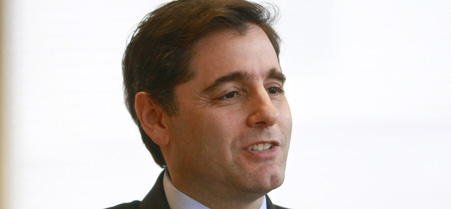FCC chief urges broadcasters to consider incentive auctions
 Jacquelyn Martin/AP file photo
Jacquelyn Martin/AP file photo
LAS VEGAS -- FCC Chairman Julius Genachowski made a sales pitch of sorts to television broadcasters Monday to consider participating in the incentive auctions recently authorized by Congress, saying they could give some TV stations a cash infusion while still allowing them to stay on the air.
"To those of you who haven't yet considered the possibilities, let me offer this: Don't be afraid to be interested in incentive auctions," Genachowski said in a speech at the National Association of Broadcasters annual convention. He directly contradicted NAB CEO Gordon Smith, who said earlier that few broadcasters had signed on to sell spectrum.
Spectrum legislation passed by Congress in February would free up more spectrum for wireless broadband providers who say they need more to keep up with customer demand. Under the incentive auction proposal, broadcasters who want to participate will say how much money it would take for them to give up all or some of their spectrum.
Genachowski noted that the law passed by Congress provides broadcasters with three possible ways to participate: They can give all of their spectrum, give up their spectrum and share a channel with another broadcaster, or volunteer to give up their higher-quality UHF spectrum in exchange for a VHF channel, which doesn't reach as many viewers.
"This is a unique opportunity that presents some very interesting - and potentially compelling - business options that did not exist before," he said. For example, he noted that if they choose to move to VHF, "a broadcaster would stay on the air, retain must carry rights on cable and satellite, and generate cash from the move. ... The core idea is this: Don't miss the boat on an opportunity you might regret passing up."
Smith said few broadcasters have told his group they may participate in the incentive auctions, but Genachowski said the FCC has heard from "many" interested broadcasters.
"The initial response from many broadcasters has been positive. Since passage of the law, our phones have been ringing at the FCC, with broadcasters and their representatives expressing genuine interest in participating and asking thoughtful questions," Genachowski said. This surprised Smith, who said following Genachowski's speech that he could count on one hand the number of broadcasters who have told him they're interested in "cashing in and going out of business."
Genachowski tried to reassure broadcasters about how the process will work and urged them to provide feedback to the commission, which will be holding a series of workshops and webinars as it moves to implement the spectrum proposals. Depite his call for feedback, Genachowski didn't stick around for questions from the audience after his speech.
He said the FCC will be considering proposed rules at its meeting later this month on allowing broadcasters to share their channels.
Genachowski gave little indication he is willing to bend on another issue that has vexed broadcasters: a FCC proposal requiring them to post online information about the ads political candidates run on TV stations. The commission is set to vote on the proposal at its public meeting later this month.
"It's the 21 st century -- I call it common sense," Genachowski said. He rejected some of the arguments made against the proposal, particularly those who claim the FCC would be requiring broadcasters to post proprietary information online. Genachowski noted that stations are already required to disclose such information now.
The NAB has voiced concern about revealing information about the rates broadcasters charge political candidates, saying putting information online that is now only available on paper at TV stations could impact the rates it can charge other advertisers. "We're happy to tell people who bought what and how much but were concerned about collateral commercial damage," Smith said. "It's a fundamentally different thing when you keep it at your station and you put it online."





